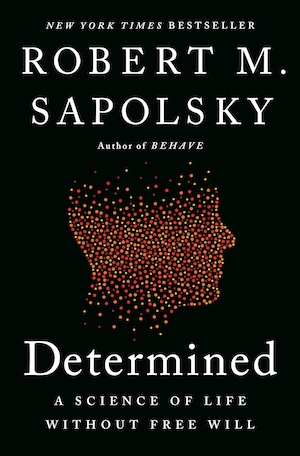By Robert Pellenbarg
Shortlisted for the 2024 ΦBK Award in Science
Robert M. Sapolsky presents, in his latest book, a thorough, contemporary examination of free will, its existence or not, and implications of this potential ambiguity. As examples of free will, consider the following:
At the personal level: You are about to purchase an item of clothing. Before approaching a sales display, you have in mind a color preference. However, you are suddenly attracted to an unexpected color choice. How/why/when exactly did this change in preference occur?
At the local level: While on a road trip, you enter a small town and notice two dining options within eyesight of each other. You are hungry but obviously must choose one. How to proceed? Will a previous bad experience at a diner affect your choice? How long to reach a decision?
At the societal level: East Asian cultures tend to be family or group oriented, and consensus is often a vital goal, whereas non-native North American cultures tend to celebrate the “rugged individual.” How did this dichotomy in genetically identical human populations evolve and persist?
Sapolsky explores the above in detail, examining how well-defined actions at the molecular level can lead to certain outcomes, for example. He describes concepts supported by chaos theory, convergence, or proven at the level of DNA records, offering mechanisms for the inheritance of selected traits. Specifically, note that threat avoidance, clearly demonstrated by contemporary descendants of ancient extinct sea slugs, is clearly demonstrated, too, in higher animal species. We will rapidly remove our hand from a hot surface to avoid damage to the hand. Do we harbor bits of sea slug DNA in our genome, bits directing our actions to avoid harm? Similarly, other “hard wired,” again via included DNA remnants, activities can affect an outcome. Note that slime molds and ants, both totally computer illiterate, have no problem foraging successfully for food. Sapolsky explores in detail how this foraging success is possible, even inevitable, as based on inherited biochemical traits. How, if at all, are such traits tied to free will?
Indeed, “detail” is a hallmark feature of the book. Sapolsky explains his thinking clearly. Often, a concept or thought is supported by a footnote that amplifies and clarifies the topic under discussion. This approach supports the reader. Another supportive feature of the book is the fact that the author writes as if he and the reader are having a conversation. Further, the text is often supported by a cogent, small illustration added to clarify a concept. The tone of the text, footnotes, and illustrations do much to illuminate topics under discussion.
The book is divided into two parts. The first part discusses processes that could affect, indeed may even negate, free will. It is clearly explained as possible that free will is but a philosophical concept, lacking clear evidence, a remnant that has been developed and embraced over millennia. The second part of the book posits no free will. What are the implications of this possibility? Will society implode, with citizens running amok? Sapolsky examines this situation in detail.
As examples of how a “retraction” of free will can influence societal thought, Sapolsky explores changing attitudes to epilepsy, leprosy, and schizophrenia. For millennia, these serious afflictions were tied to malign spirits, demons, bad luck, and other random external causes. Of course, carefully focused research over the past 50 years has clearly shown the subtle biochemical nature of these conditions, all of which can now be treated. As a specific example of how societal thinking has changed over the recent past, it is now acknowledged that serious events perpetrated during an epileptic seizure are not criminal in nature.
Determined offers a thorough and detailed examination of the current status of an ancient proposition, the existence of free will. Much of the material summoned to the task is based on rigorous research results from the past 50 years and, notably, material from the past 10 years. Current biochemical and brain developmental research relies on such high-tech examinations as Magnetic Resonance Imaging (MRI), brain scanning, and carefully designed laboratory studies often using nothing more than questionnaires. Nonetheless, these approaches do provide unequivocal insight into the free will conundrum.
The reader will be supported in examining/assessing this insight, and its implications, by a reader friendly text, a chat-like setting in the book, and detailed and supportive explanations of what Sapolsky is saying. A choice to read the book will not disappoint but, honestly and correctly, will provoke serious thought. Such an outcome is to be embraced. Sapolsky delivers.
Robert Pellenbarg (ΦBK, George Washington University) is a research adjunct professor in the Department of Chemistry at California State University, San Bernardino.




